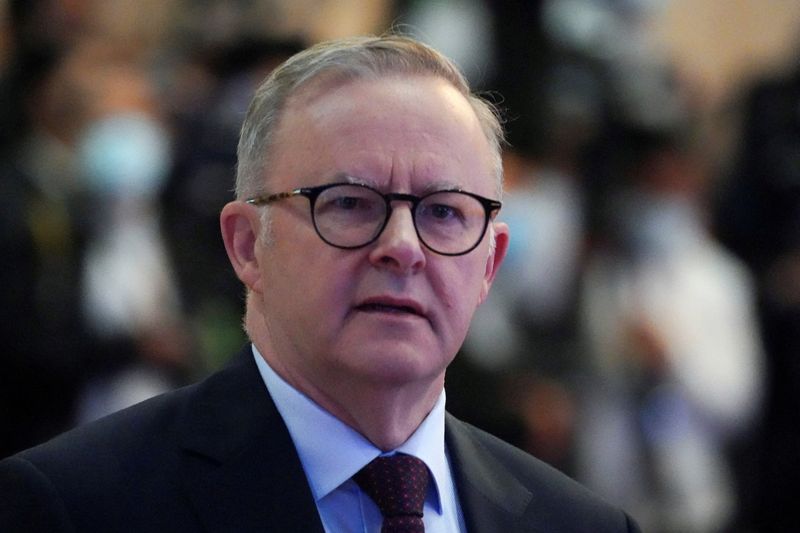By Kirsty Needham
SYDNEY (Reuters) -Australia is briefing neighbouring Asian countries on its plan to build nuclear submarines ahead of an announcement about it in the United States, Prime Minister Anthony Albanese said, as local media reported the programme could generate 20,000 jobs.
U.S. President Joe Biden, Albanese and British Prime Minister Rishi Sunak will meet in San Diego on Monday local time to announce a plan for Australia to acquire a fleet of nuclear-powered submarines next decade.
Australia was informing its regional neighbours about the plan, known as AUKUS, Albanese said on Sunday in San Diego, after meeting with Sunak.
"I've been talking with other leaders in the region, as well, explaining our position. And it's been well-received and understood why we're doing this," Albanese told reporters.
China has objected to the transfer of nuclear propulsion technology to Australia. AUKUS is seeking to counter China's military buildup and its pressure on Taiwan.
The 2021 announcement that the U.S. and Britain would share nuclear submarine technology with Australia came as a surprise to many Southeast Asian governments, said Perth USAsia Centre chief executive Gordon Flake.
"The government is right to reach out: a lot of the initial misunderstanding around the deal in Southeast Asia was they didn't understand the nuance between a nuclear-powered submarine and a nuclear-armed submarine. Those concerns have long since been dissipated," he said.
At home, Albanese is under pressure to show the nation's most expensive defence project in its history is affordable, and will lead to jobs and a boost for local industry. Reuters has reported that it is expected the first submarines would be purchased from the United States and that in the later stages of AUKUS, a joint project would involve a British design.
Government modelling showed 20,000 jobs, including 8,500 in submarine construction, would be created in Australia over 30 years, local newspapers reported on Monday.
"This is about jobs, including jobs and manufacturing and Adelaide in particular will be a big beneficiary of this announcement, as well as Western Australia," he told reporters on Saturday.
Stephan Frühlin, head of the Australian National University's Strategic and Defence Studies Centre, said that most manufacturing for Australia's existing Collins-class submarine fleet is local but that it would not be realistic to expect the same for a nuclear submarine.
"A big slice will be built overseas - the nuclear reactor," he said. "The political class conditioned the Australian public to expect defence spending will be good for Australian jobs."

Flake said Albanese was correct to focus on the longer-term economic impact of servicing the nuclear submarine fleet.
"We really shouldn't be fixated on where the first ship will be built and how many dockyard workers. Servicing and sustaining them is a longer jobs pipeline than the build itself," he said.
